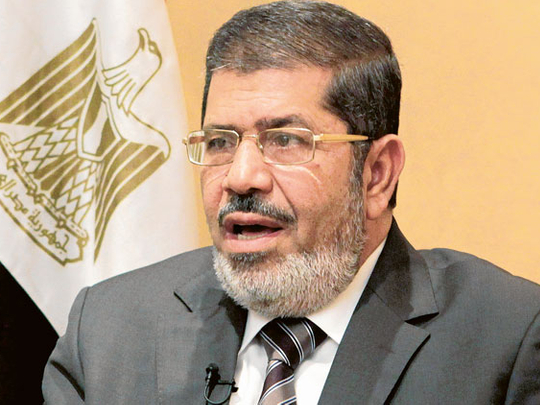
It must have been unsettling for President Mohammad Mursi to find himself, on the second anniversary of the Egyptian revolution, forced to take measures reminiscent of those used by Hosni Mubarak in a last-minute attempt to rescue his regime from collapse. Faced with growing unrest and the failure of police to contain the turmoil in central Cairo and elsewhere, Mursi ordered the army to restore order in Port Saeed, Suez and Esmailia.
There are some parallels with the 18-day uprising that ended Mubarak’s 30-year rule. However, apart from some wishful thinkers in Tahrir Square, no one is seriously claiming that history will repeat itself, at least not so soon.
Mursi still enjoys the legitimacy (albeit rapidly eroding) of popular election and has a sizeable Islamist constituency, mainly in rural Egypt. The White House has expressed cautious support for his response. But first indications are that his gamble has at least partially backfired. Thousands of demonstrators took to the streets in defiance of a curfew, denouncing him and the Muslim Brotherhood.
The immediate trigger was the sentencing to death of 21 fans of Port Saeed’s football club, Al Masry, for their role in Egypt’s worst ever football violence in February last year. More than 70 supporters of the Cairo club Al Ahly (known as Ultras) were killed after a match between the two sides.
This was a level of violence not seen before in Egyptian football, which gave rise to suspicion that the bloodshed was politically motivated. The Ultras had played a key role in the protests that toppled Mubarak and almost everyone suspected elements within the security services of orchestrating the killings.
When the verdict was handed down in Port Saeed last week, the Ultras celebrated, while relatives of those sentenced exploded in anger. They had laid siege to the prison where the defendants were being held in an attempt to free them. In the ensuing violence 30 people were killed.
Few — except those who want to score political points — can fail to see that Mursi’s attempts to restore order were at least partially justified to defend the rule of law. Attacks on police stations, jails and courtrooms have become all too frequent over the past two years and most Egyptians would be happy to see an end to the chaos. Predictably, Mursi’s political enemies saw in the Port Saeed troubles an opportunity to pile on the pressure. But it is doubtful that, faced with the same threat, they would have acted differently.
Mursi sought to defuse the political crisis and offered the opposition a dialogue — an offer that has now been rejected on grounds that ‘we have heard it all before’. They have demanded a transparent and credible process to amend the Islamist-leaning constitution drafted by Mursi’s Islamist supporters and adopted by a slim majority in a controversial referendum with a relatively low turnout last month.
— Guardian News & Media Ltd










